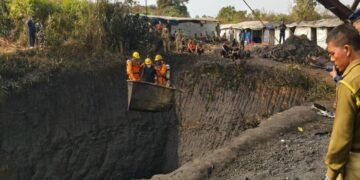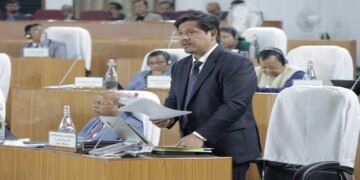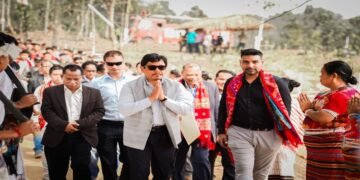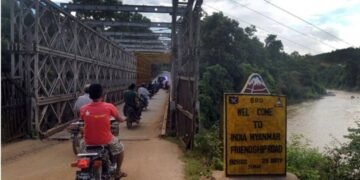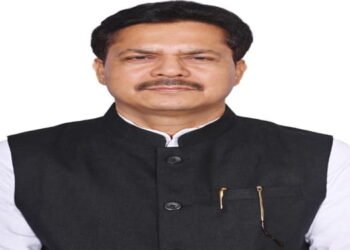Tura ( Meghalaya), July 21 : The call for establishing Tura as the Winter Capital and implementing a Backlog policy has gained unprecedented momentum as local leaders, religious figures, and senior citizens flock to support the initiative. The move seeks to address long-standing development disparities and infrastructure backlog in the region, sparking hope for a brighter future for the residents of Tura.
In an extraordinary show of unity, headmen and local leaders from various communities across Tura have thrown their weight behind the Winter Capital proposal. Citing the region’s unique cultural heritage, abundant natural beauty, and strategic geographical location, these leaders believe that Tura is perfectly poised to become the country’s hub during the winter months.
A prominent headman, expressed his enthusiasm, saying, ‘Tura has always been an overlooked gem in our country. By designating it as the Winter Capital, we can showcase our rich traditions and attract tourists, which will breathe new life into our local businesses.’ Religious leaders from diverse faiths have also come forward to support the Winter Capital initiative. They believe that this opportunity will not only spur economic growth but also foster interfaith harmony and cultural exchange in the region.
A respected pastor in Tura, commented, “As spiritual guides, we see the potential for Tura to serve as a symbol of unity and understanding among different religious communities. The Winter Capital status can help promote tolerance and inclusivity. The proposed Backlog policy has been met with resounding approval from the elderly population in Tura. Over the years, infrastructure development in the region has lagged behind other major cities, hindering progress and impeding the quality of life for residents.
Speaking on behalf of senior citizens, one senior citizen said , ” We have seen Tura grow over the decades, but much remains to be done. The Backlog policy is a long- awaited solution to bridge the gaps and ensure that our town receives the attention it deserves.”
As discussions continue, the groundswell of support from headmen, pastors, and senior citizens has given new hope to the residents of Tura. With the Winter Capital and Backlog policy gaining traction, it is evident that Tura’s time to shine has finally arrived. As the nation eagerly watches, the realization of these initiatives could mark a transformative chapter in the region's history, propelling Tura toward a brighter and more prosperous future .
Achik Conscious Holistically Integrated Krima (ACHIK) organization has called upon the Chief Minister of Meghalaya to demonstrate unwavering political will in the long-standing demand to declare Tura as the Winter Capital and take decisive action to address the backlog policy in the state. ACHIK leaders believe that these steps are crucial for the equitable development and inclusive growth of the entire region.
The ACHIK leaders, along with various community representatives, gathered in Tura to present their case to the Chief Minister, emphasizing the need for a balanced focus on both the western and eastern regions of Meghalaya. For decades, the Winter Capital demand has been a contentious issue, with many arguing that it would help address the developmental disparities between the regions and ensure better governance during the winter months.
Speaking at the gathering, ACHIK’s spokesperson, Labenn Ch Marak, said,” We urge the Chief Minister to look beyond mere administrative convenience and take into account the genuine concerns of the people in the western region. Tura, being a major town and the cultural heartland of the Garo community, deserves to be recognized as the Winter Capital. This move will not only boost development but also foster a sense of inclusion and equal representation.”
The Winter Capital concept envisions that during the harsh winter months, the state’s administrative machinery will operate from Tura instead of Shillong, the current capital. This approach aims to ensure that policy decisions and developmental initiatives are dispersed more evenly, avoiding the concentration of resources in a single region.
ACHIK also highlighted the big gap between Shillong and Tura in terms of distance which is a stretch of 323 Kms long, which is one of the major issues that the western part of Meghalaya faces in all aspects of office work.
Simultaneously, the ACHIK leaders also highlighted the pressing need to address the backlog policy. This policy aims to address the historical neglect and discrimination faced by certain marginalized communities, especially in the western regions of Meghalaya. The backlog policy would involve allocating equal vacancies and especially the jobs the Garo people have been deprived of in terms government jobs in the past 50 years .Labenn Ch Marak said, ” It is of paramount importance to implement the backlog policy in a time-bound manner. The state must take proactive steps to uplift communities that have suffered from years of neglect and economic disparities. This policy can be a step towards healing the wounds of the past and building a stronger, more cohesive Meghalaya.”
While the demands put forth by ACHIK have garnered support from many sections of society, there are also voices cautioning against hasty decisions. Some argue that a thorough assessment of the implications of such policies is necessary before implementing them.
Responding to the CM’s statement on his non-committal, Labenn addressed the importance of the demands and promise to convene a high-level committee to review the implications and possibilities. “We understand the logistics in these issues and we also would like to ask the government to carefully evaluate the feasibility of declaring Tura as the Winter Capital and work towards a more equitable Meghalaya,” he said.
As the debate continues, the hopes for a more inclusive and balanced Meghalaya remain high. The ACHIKs call for political will in implementing these policies serves as a reminder that the state’s progress can only be truly meaningful when all its citizens are part of the journey towards growth and development.




